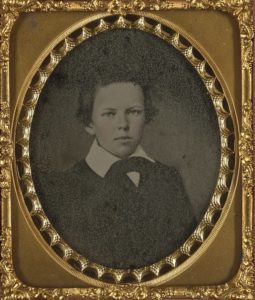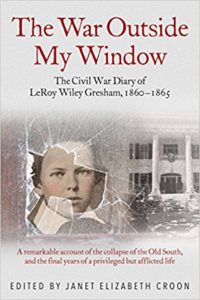
In April 1865, more than just the Confederacy was dying in Macon, Georgia. LeRoy Wiley Gresham was dying too. Only 17, he succumbed to tuberculosis a few months after the Civil War ended.
What made LeRoy Wiley Gresham different was his writing. Unable to work or fight due to a leg injury he received as a child when a chimney collapsed on him, he sought release in his diary. LeRoy wrote every day, describing his experiences of the war and summarizing the news. He offers the not only an adolescent’s viewpoint, but the poignant perspective of a dying child. The volumes he produced are now a prized acquisition at the Library of Congress and have been on display there.
LeRoy Wiley Gresham’s diary will appear in print for the first on June 1. Janet Elizabeth Croon, who edited the volume and researched the diary entries, joins us today for an interview.
AMA: The Library of Congress describes LeRoy Wiley Gresham’s diary as one of its “premier holdings.” It acquired the diary in the 1980s but it hasn’t yet been published. Why?
JEC: I think there are a few reasons why. One is that there are seven journals, and LeRoy wrote at least something every single day of the Civil War, with only a few exceptions. They are a large collection to deal with! Secondly, I think that some of the sleuthing that was required to really understand the entries might have been daunting. It took the assistance of a pair of wonderful librarians at the University of Georgia and one at the local library in Macon to help me find out where exactly the family’s two plantation holdings were located. I also had to figure out the complex family network that LeRoy had. Of course, he knew who all the people he was writing about were, but I didn’t have much of a clue! I ended up with a family tree on Ancestry.com that has exactly 1700 people included – and I still cannot place the three Knox cousins! Lastly, despite his gorgeous handwriting, there are places that are just hard to read. I was able to use the digital pages and magnify them if I needed to in order to understand what was written. Writing conventions, like with hyphenization at the end of a line, are different and didn’t always make sense. It was a big job, and unfortunately, I had the time available due to a long-term disability issue.
LeRoy began writing at age 12, and his journals end at age 17.
How did you discover LeRoy Wiley Gresham?
Social media! A post about the initial Washington Post article about the collection being on display for the sesquicentennial of the beginning of the Civil War was in my Facebook newsfeed. With my career of teaching high school students LeRoy’s age, I was interested immediately. I am friends with Ted Savas, who runs Savas-Beatie publishing, and he was entranced by LeRoy as well.

What makes LeRoy Wiley Gresham’s diary stand out among other Civil War diaries?
One of the initial things Ted asked me to do was to get familiar with diaries/memoirs of the Civil War and see what I could draw from that. I’ve been working for four years on another project (the Civil War in Northern Virginia, where I live) and so I was already familiar with many, like the very well-known diary by Mary Chesnut, John Mosby’s memoirs, the memoirs of W.W. Blackford, and more. But the thing was, they were ALL adults and ALL directly involved in the war. Mary Chesnut, for example, was the wife of an influential former member of the U.S. Congress and close friends with Varina Davis. W.W. Blackford and John Mosby were both combatants who rode with J.E.B. Stuart. But LeRoy began writing at age 12, and his journals end at age 17. He was neither a combatant, and although he knew plenty of influential people due to his family’s status, he was strictly an observer for the vast majority of the journals. He read, listened, and reported everything – so you get the Civil War written with the perspective of a teenager who is eager to soak up as much information as he can about the war, society, politics, and more.
This ends up being one of the critical questions that I had at the end – to what extent did a lack of coherent economic policy lead to the demise of the Confederacy?
Did you make any surprising discoveries in the course of your research?
Yes! When I began this project, I thought it would be simply transcribing his written work and fleshing out a few things in footnotes. But it ended up being such a multi-layered work! Not only did I learn about LeRoy’s life, but about how life in Macon changed during the war. For example, to ensure that people could access finished cloth from the Macon Mills (which his father ran as principal partner), they would accept a pound of bacon to pay for a yard of cotton goods. The Mill then sold the bacon to the Army of the Tennessee to feed the soldiers! And they also provided about 1500 pounds of bacon free of charge to the poor. So economically, the people were making things work on their own. This ends up being one of the critical questions that I had at the end – to what extent did a lack of coherent economic policy lead to the demise of the Confederacy?

You studied European history. Could you use your training in that area to research an adolescent during the American Civil War?
This is an excellent question. The details are obviously different, but the story of people who are trying to survive vast change to their society, whether it is the time of the French Revolution, the Weimar Republic, or World War II, is much the same. How are we going to get enough to eat? What do we do if the war comes here? What happens if our loved ones don’t come home? Why are we not getting accurate information from the media? Those are all common threads. Since I have spent many years teaching teenagers, I know that they are interested in how people their age dealt with crises of a mass scale. Watching their faces as they listen to BBC radio trying to link young Holocaust survivors of their own age with relatives thought to be living in England brought that message home to them. Understanding these common threads made understanding LeRoy’s writing and his concerns easier, and he voices many of them himself as well.
LeRoy wrote at least something every single day of the Civil War, with only a few exceptions.
You mentioned to your editor that LeRoy Wiley Gresham’s diary bears a faint resemblance to The Diary of Anne Frank. In what ways are they similar?
They are both teenagers that are in one way or another viewing the destruction of the life they knew from a distance. For Anne, this meant being literally hidden away in the attic in Amsterdam. For LeRoy, it meant watching the war from his home, knowing his disability would not include him in the actual military conflict. And they are both such eloquent, authentic writers! They let you in to their most personal thoughts… and that is quite an unanticipated gift to the rest of us.
And both of them died after they wrote their diaries….
Yes, they both did die after they wrote their diaries. Anne died of typhus in Bergen-Belsen concentration camp with only her sister with her; she had to endure the horrors of the Holocaust. LeRoy died at home, nine days after his last journal entry; he died of the illness he had been enduring all throughout his seven journals. So their deaths were both from the situations that kept them observers. Hers was the external threat of Nazi extermination, while his was the internal threat of active tuberculosis.
How do they differ?
Well, obviously, they are writing almost 100 years apart, so there are obvious differences there. And the inner life of a boy and a girl in adolescence are different. Anne wrote about her feelings with great depth when it came to boys; we only get a hint of a crush or two from LeRoy. Anne is hiding due to her religion; LeRoy is excluded because of his medical status. His most private feelings have to do with his health issues, which Anne did not have to deal with.
You worked together with a doctor to decipher LeRoy Wiley Gresham’s symptoms and come to a diagnosis of tuberculosis. How does an understanding of LeRoy’s illness shed light on his diary entries?
Both Ted and I assumed that LeRoy’s death was the result of something else. We both knew that he was physically disabled due to the accident he had at age 8 when his leg became crushed under falling brick; he often says that that was the start of all his “troubles.” We also both thought he had asthma, and I thought he died of dysentery, which was going around Macon at the time. We could not have been more wrong! Without giving it away, Dr. Rosbach is a surgeon who has an affinity for the Civil War and is an acquaintance of Ted’s. He read through a transcript I created of LeRoy’s symptoms, complaints, medications, and came up with what the actual cause was, and it really had very little to do with his leg accident. Having read some of the family letters from the Library of Congress prior to the war, I discovered that his parents knew the truth, but did not tell their son. People may question their decision, but I think it was the right one. This lack of knowledge that he was dying of a terminal disease gave him hope and kept him going for as long as he could, and gave him a better and happier quality of life. LeRoy always was hoping to be cured… and it makes reading the journal entries very powerful.
What does LeRoy Wiley Gresham’s diary add to the existing Civil War literature?
LeRoy provides us with a different kind of overview to the war, giving us a timeline based on events as they happened. For people who are not Civil War aficionados, this is a great way to learn about the major battles, strategies, and personalities of the day. What it also adds for those who already have an understanding of the battlefield is a detailed sketch about the home front in the Civil War South. Through LeRoy’s writing, we get a much better understanding about how the people of the South felt about the war, how they got (or didn’t get) their information on the fighting, what changes they had to make in their daily lives, and what it was like to live in an occupied city at the end. There is also a lot of information about the relationship between the Gresham family and the many slaves they owned, both at their Macon home and their two plantations in Houston County. And there is the medical aspect: how a deadly disease of the 19th century approached by medical professionals at the time.
Thank you, Janet Elizabeth Croon!

Janet Elizabeth Croon, ed., The War Outside My Window: The Civil War Diary of LeRoy Wiley Gresham (Savas Beatie, 2018), 432 pages, annotated.



Thank you for such a terrific opportunity to share my book! The thoughtful questions really allowed a more in-depth discussion.
~Jan
My pleasure, Janet! Your book is fascinating, otherwise I wouldn’t have done this blog post. Good luck with your launch!
Thank you for posting this interview with Janet Croon. Your support of her and her book, “The War Outside My Window”, is appreciated. For those who would like more information about this book, please visit our website: http://www.savasbeatie.com
You’re welcome, Lisa. Someone made a comment on my Facebook timeline about not being able to see a reading sample of this book. Will you make one available?
The interview mentions three Knox cousins. One of my great grandmothers ws Francis Lee Everett, born Knox. That family was from Lincoln County, Georgia. I have their line back several generations if that might be of interest.
Francis (nicknamed Annie) Lee Knox married Henry Daniel Everett, my great grandfather. They lived in Twiggs County, just outside of Macon, which is next to Houston County.
That is fascinating, John. I’ll alert Janet Elizabeth Croon to see if she’d like to contact you about your family tree. Thanks for commenting.
Thank you for that information, John! The names of the three cousins are Bowie, Jimmy, and Samuel. Sam was killed at Franklin, Tennessee in 1864. I would love to know if they are in your family tree!
Hi Janet,
My organization and I would be interested in promoting or sponsoring your book signing event in Macon Ga. on June 9th at LeRoy’s former home. The M.O.S.&B. also has awards for authors including grants for the winners. Please contact me ASAP so we can talk. Thanks for your great work. Ann Marie, you have my permission to give Janet my email.
Sincerely,
Martin N. Bell, Ga. Society Commander, Military Order of Stars and Bars, Macon, Ga.
Thanks for offering Janet that wonderful book promotion opportunity, Mr. Bell. I’ve emailed Janet, like you requested. I’m in the States and will also see her tomorrow, so I’ll tell her in person, too.
This book really interests me because I have always loved reading autobiographies written by the common soldier on both sides of the Civil War, and also biographies of various leaders. But I’m always most interested in the perspective of the seemingly common, ordinary men and women of the past. I’ll definitely be buying this book, I’m very interested in his thoughts about the war. I’m sure it will be especially interesting because of his age while writing this diary. The questions and answers really perk my interest.
Gresham’s diary really does offer a unique perspective. I’m glad the interview interested you in the book! Thanks for commenting, Susan.
A great read! Reading LeRoy’s daily routine and the disease he struggled with each day, his hopes for a cure, his expectations for a successful conclusion of the war, and his love and devotion to his family — and they for him — make for riveting reading. I initially hesitated about buying this book. I am thankful I did. Of all my books about the Civil War this ranks with the best.
It’s certainly one of the most poignant Civil War stories. Thanks for commenting.